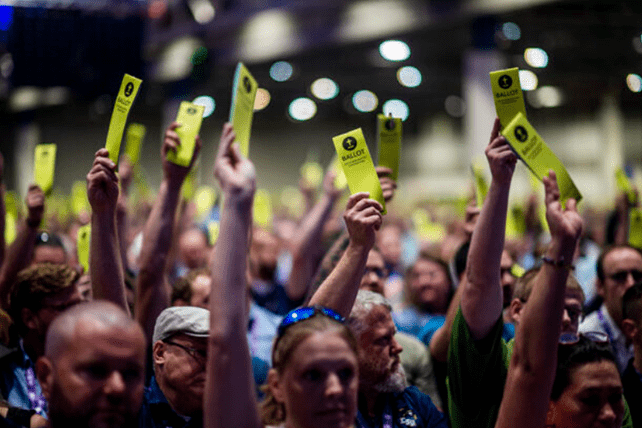A popular figure at first, Moore faced intense backlash from Trump allies such as Graham, a former SBC president and pastor of Prestonwood Baptist Church near Dallas, when he refused to back Trump’s first run for presidency and criticized him instead. In 2017, Prestonwood and about 100 other churches withheld their donations to the SBC’s Cooperative Program in protest of Moore’s action. A pair of leaders of the SBC’s Executive Committee also clashed with Moore over his criticism of Trump.
While Moore resigned in 2021, tension over the ERLC has remained a constant in SBC life. The agency has also faced internal conflict — last summer, a former ERLC chair announced that the agency’s president, Brent Leatherwood, had been fired after a social media post praising then-President Joe Biden. The following day, that chair was ousted and the entity’s board announced Leatherwood was still on the job.
There have been three votes to defund or disband the ERLC since Trump took office the first time — all of them have failed but between a quarter and a third of messengers at the 2024 annual meeting appeared to support closing the agency. The SBC’s rules require two votes in successive annual meetings to shut down an entity such as the ERLC.
Randy Davis, executive director of the Tennessee Mission Board, told Religion News Service in an interview that he still believes the ERLC plays a helpful role for Southern Baptists. He said the ERLC, for example, had worked closely with Tennessee Baptists on issues such as sexuality and gender — Tennessee Baptists, like the ERLC, support a state law that bans gender transition surgery for minors.
Davis doesn’t think the convention floor is the best place to decide the future of the ERLC. Instead, he’d rather a commission be set up to discuss the SBC’s ministry as a whole — and where the ERLC fits into that mission.
“I think Southern Baptists would appreciate that kind of careful collaboration and consideration, rather than being divided on the floor of the convention,” he said.
The ERLC set up a church engagement office after the vote at the 2024 SBC meeting — and encouraged staff to abide by a set of guidelines in deciding what issues the entity should speak to.
“We have sent surveys requesting feedback, hosted pastor calls, led groups of pastors to meet with elected leaders in DC, and intentionally attended events where pastors and other ministry leaders were gathered,” Miles Mullin, an ERLC vice president, said in an email.
Al Mohler, a former ally of Moore and the ERLC and president of the SBC’s largest seminary, is now among those who have doubt about the entity’s future. Mohler, a former “Never Trumper” turned supporter of the president, told a popular SBC podcast recently that he had “grave doubts” about the usefulness of the ERLC — and that having an entity that addresses controversial cultural issues is “a risky proposition.”
“Other entities and the churches themselves have grave doubts about the utility of the ERLC,” Mohler told the “Baptist 21” podcast last month. Mohler added that as the head of an SBC entity, he could not lead any effort to disband the ERLC.
Texas pastor Andrew Hebert said he’d like to see the ERLC limit itself to speaking only about issues that are directly addressed in the denomination’s statement of faith — known as the Baptist Faith & Message — or in recent resolutions passed at the SBC’s annual meeting. He outlined that proposal in a recent article on The Baptist Review, a website that discusses SBC issues and theology. Those boundaries, he said, could help the ERLC from stepping on land mines.

